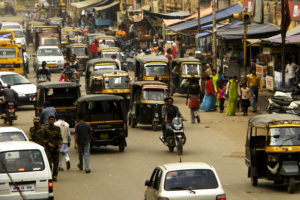If the return of Delhi’s smog has left you worrying about its effects on your children, here’s more bad news. The effects start from before birth.

English researchers have found that babies of mothers exposed to road trafffic pollution are more likely to have low birth weight. Weight at the time of birth is one of the indicators of a baby’s chances of survival and his/her future health.
“The findings suggest that air pollution from road traffic in London is adversely affecting fetal growth. The results suggest little evidence for an independent exposure-response effect of traffic related noise on birth weight outcomes,” reads the paper published in the peer-reviewed British Medical Journal. In all 671509 births were analysed from municipal registers. In addition maternal residential addresses at the time of birth were mapped to draw correlations with pollution levels. The study was done by researchers from Imperial College, London, King’s College London and the London University.
Low birth weight is defined by the World Health Organization (WHO) as weight at birth of less than 2500 g (5.5 lb). Low birth weight is a significant public health problem globally and is associated with a range of both short- and long term fallouts. Overall, it is estimated that 15% to 20% of all births worldwide are low birth weight, representing more than 20 million births a year.
The BMJ paper adds: “To our knowledge, this is the largest UK study on air pollution and birth weight, and the first UK study and largest study worldwide of birth weight and noise exposure. We observed that long term exposure during pregnancy to NO2, NOx, PM2.5 overall and specifically from traffic exhaust and non-exhaust sources, and PM10, were all associated with increased risk of LBW at term, across London. There was strong confounding of the relation between road traffic noise and birth weight by primary traffic related air pollutant coexposure.”
A linked editorial advocated personal protection. “With compelling evidence of harm from environmental air pollution, pregnant women should consider how to reduce their risk. Air filtering facemasks might reduce acute exposure to particulate pollution, but there is no evidence that they reduce chronic exposures. Other strategies include changes to walking routes away from major roads and avoiding outdoor activity when air quality is at its poorest. However, the ubiquity of poor air quality in urban areas like London mean that personal behaviour changes are unlikely to result in substantially different long term exposures. Such lifestyle changes are not realistic for many pregnant women, owing to constraints from employment patterns, residential location, and transport options. These constraints are highest in those who are socioeconomically disadvantaged, contributing to health inequalities,” it says.


